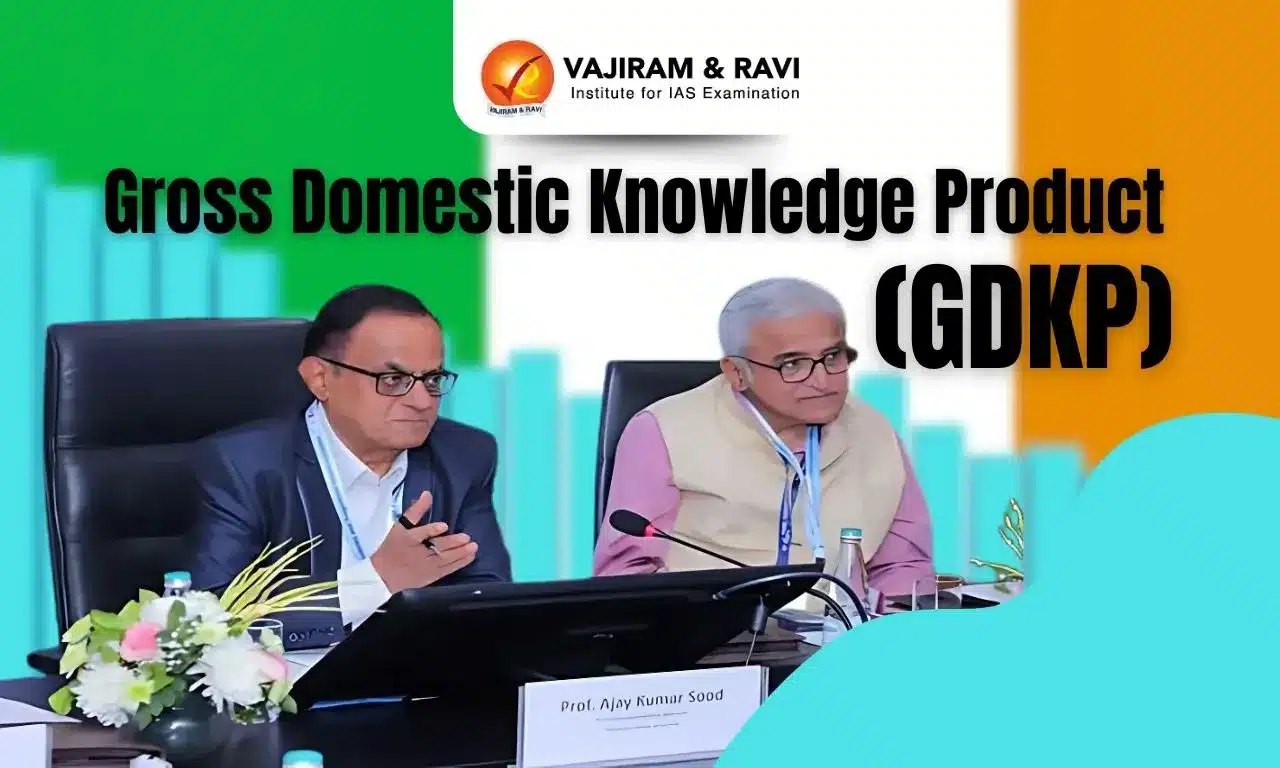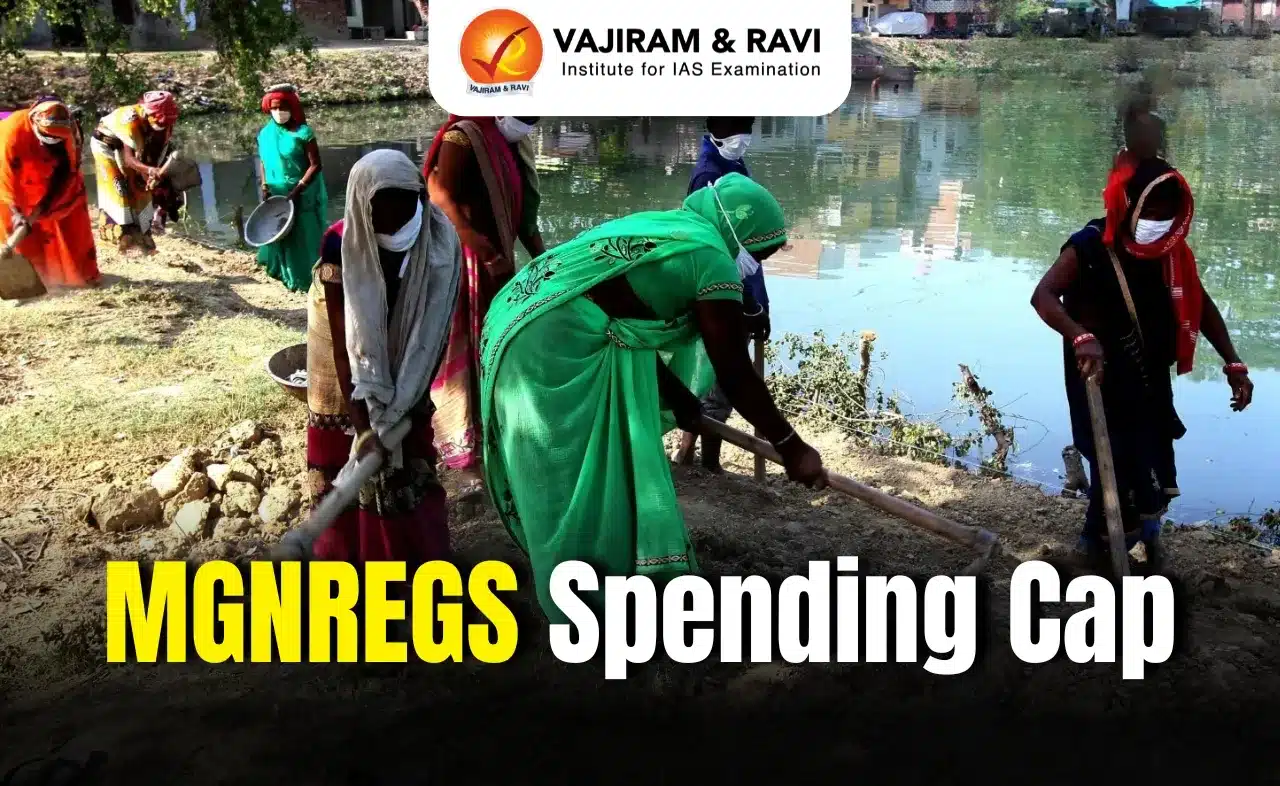What’s in Today’s Article?
- Gross Domestic Knowledge Product (GDKP) Latest News
- About Gross Domestic Knowledge Product (GDKP)
- Need for GDKP in India
- Capturing the Impact of Knowledge on Economic and Social Life
- Challenges in Implementing GDKP
- Conclusion
- Gross Domestic Knowledge Product (GDKP) FAQs
Gross Domestic Knowledge Product (GDKP) Latest News
- The government is reviving its 2021 plan to supplement GDP with a new metric, the Gross Domestic Knowledge Product (GDKP), to measure the impact of knowledge on economic and social life.
- Recently, the Ministry of Statistics and Programme Implementation (MoSPI) held a session to discuss the conceptual framework.
- GDKP would better reflect the contributions of innovation, intellectual assets, and knowledge-driven sectors to India’s economic growth.
About Gross Domestic Knowledge Product (GDKP)
- The GDKP is a proposed metric to supplement Gross Domestic Product (GDP) by capturing the contribution of knowledge-driven sectors, intellectual assets, and innovation to the economy.
- Unlike GDP, which primarily measures economic output through production and consumption, GDKP aims to assess the impact of knowledge on economic and social development.
Need for GDKP in India
- The government recognizes that in an era of rapid technological advancements and digital transformation, traditional economic indicators may not fully reflect the value generated by intellectual capital, research, and innovation.
- Capturing the Knowledge Economy
- India is experiencing growth in research, patents, software development, AI, digital services, and intellectual property.
- These knowledge-driven sectors significantly contribute to economic progress but are not fully accounted for in GDP measurements.
- Beyond Traditional Economic Indicators
- GDP focuses on tangible goods and services but does not adequately reflect knowledge creation, education, and digital transformation.
- A more holistic metric is required to understand how knowledge impacts economic and social well-being.
- Aligning with Global Trends
- Many advanced economies are working on alternative indicators that measure intangible assets, digital innovation, and intellectual capital.
- India aims to develop a framework that aligns with these international efforts.
- Policy and Investment Decisions
- A well-defined GDKP could help the government formulate better policies for sectors like education, research, technology, and entrepreneurship.
- It could guide investment in knowledge infrastructure, such as R&D, digital connectivity, and skill development.
Capturing the Impact of Knowledge on Economic and Social Life
- Currently, Intellectual Property Products (IPP) are recorded under Gross Fixed Capital Formation (GFCF) in the GDP dataset.
- GFCF is the total value of assets acquired for production purposes, minus the value of assets disposed of. It’s also known as investment.
Satellite Account for Knowledge Economy
- Currently, discussions are underway to explore the feasibility of a satellite account to measure the knowledge base of the economy.
- MoSPI has prior experience with tourism, culture, ocean, and blue economy satellite accounts.
- However, a framework for capturing the knowledge economy is lacking.
- A technical committee will be formed to evaluate and guide the proposal.
NITI Aayog’s GDKP Proposal
- The GDKP was initially proposed in 2021 by NITI Aayog, but the National Statistical Commission found that it lacked a clear methodology for data collection and computation.
- It noted the need for identification of knowledge parameters and adjustments to ensure accurate reflection of outcomes.
- However, due to various complexities, after a review by NITI Aayog in August 2021, the project was shelved.
Challenges in Implementing GDKP
- Data Collection Issues
- Unlike GDP, which relies on well-established economic indicators, GDKP requires new methodologies to measure knowledge output.
- Data on intellectual property, research output, digital innovation, and human capital development is fragmented and difficult to quantify.
- Integration with GDP
- Since some aspects of knowledge contribution are already captured in GDP (e.g., Intellectual Property under Gross Fixed Capital Formation), integrating GDKP with GDP without duplication is a challenge.
- Subjectivity in Measurement
- The National Statistical Commission earlier noted that defining and quantifying knowledge parameters is highly subjective and requires extensive refinement.
- MoSPI has acknowledged the need for a proper methodology to ensure accuracy and avoid perception-based estimations.
Conclusion
- India’s move to explore GDKP reflects its ambition to shift from a production-based economic model to a knowledge-driven one.
- While challenges exist in defining and measuring knowledge contributions, a well-structured GDKP could provide valuable insights for policymaking, investment, and long-term economic planning in an increasingly digital and innovation-led economy.
Gross Domestic Knowledge Product (GDKP) FAQs
Q1. What is meant by Gross Fixed Capital Formation?
Ans. It is the total value of assets acquired for production, minus disposed assets, reflecting investment in an economy.
Q2. What is a simple definition for GDP?
Ans. It is the total value of assets acquired for production, minus disposed assets, reflecting investment in an economy.
Q3. What do you mean by knowledge economy?
Ans. A knowledge economy relies on intellectual capital, innovation, and technology rather than physical production for economic growth.
Q4. What are the four pillars of the knowledge economy?
Ans. Education, innovation, information infrastructure, and an economic framework supporting knowledge-based industries define a knowledge economy.
Q5. What are Intellectual Property Products (IPP)?
Ans. IPPs include patents, copyrights, trademarks, and trade secrets, legally protecting innovations and creative works.
Last updated on June, 2025
→ UPSC Notification 2025 was released on 22nd January 2025.
→ UPSC Prelims Result 2025 is out now for the CSE held on 25 May 2025.
→ UPSC Prelims Question Paper 2025 and Unofficial Prelims Answer Key 2025 are available now.
→ UPSC Calendar 2026 is released on 15th May, 2025.
→ The UPSC Vacancy 2025 were released 1129, out of which 979 were for UPSC CSE and remaining 150 are for UPSC IFoS.
→ UPSC Mains 2025 will be conducted on 22nd August 2025.
→ UPSC Prelims 2026 will be conducted on 24th May, 2026 & UPSC Mains 2026 will be conducted on 21st August 2026.
→ The UPSC Selection Process is of 3 stages-Prelims, Mains and Interview.
→ UPSC Result 2024 is released with latest UPSC Marksheet 2024. Check Now!
→ UPSC Toppers List 2024 is released now. Shakti Dubey is UPSC AIR 1 2024 Topper.
→ Also check Best IAS Coaching in Delhi





















